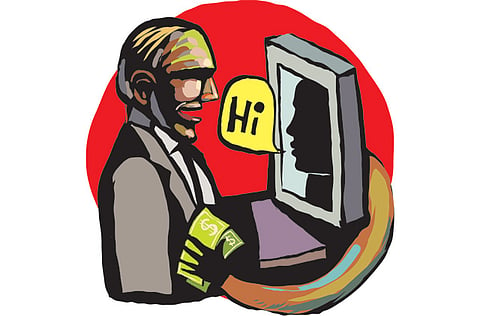Generosity does not come cheap
It pays to remember that if an offer sounds too good to be true, it is probably a scam

As a writer, one of the consequences of having my e-mail address appear in public is that in addition to receiving genuine feedback, I am also subjected to a multitude of offers and solicitations.
Just this past weekend I received several proposals that would have made me a very rich man, and with little effort. Sent primarily from various sources purportedly in Africa and Asia, these individuals deemed me worthy and noble enough to be entrusted with some very large fortune. It was certainly heady enough to make one feel honoured.
The first one was from a Fatima Rasheed from the Democratic Republic of Congo. Apparently her husband had been killed by mercenaries, leaving behind the sum of $82 million (Dh301.59 million) that she would like to put towards a noble cause. As an honest soul, I would be her conduit in setting up such a transaction, and naturally I would be entitled to 20 per cent of the sum. That's a cool $16.4 million folks! But how did she know I was that honest?
Wodi Martens is orphaned. His parents, white farmers in a very fertile country, were killed in Zimbabwe by Mugabe's forces, after which Wodi fled with his aunt to Johannesburg, South Africa. But not before selling the family assets worth $38 million and depositing the proceeds in a bank in Holland. He offered me 25 per cent of his fortune for re-arranging the transfer of these funds into his hands. I would be $9.7 million richer. Why Wodi does not simply arrange that himself escapes me.
John Briggs from the UK, representing a client from Uganda, was left with £22 million (Dh130.45 million) on his hands, courtesy of the sudden death of the client, who has no next of kin. The money that Briggs is holding has to be disposed of somehow. And since "banking ethics", as he puts it, do not allow such money to remain in the UK unclaimed for over five years, he is prepared to split the funds 70/30. Very generous of him, since he gets to keep the lion's share. I was to play the part of the next of kin. I had to do a double take in the mirror to see if I could pass myself off as one of Idi Amin's lost cousins. For £6.6 million, I could impersonate a Chinese acrobat!
Sergeant George Hicks, an American serving in Iraq, somehow managed to take off with a sizeable portion of Saddam Hussain's fortune. Before Barack Obama pulled him and his troops out, he deposited this loot in several safety deposit boxes at a local bank in Baghdad. He needs me, an Arab, to get it out. Has he been to Iraq lately? Chances are I wouldn't make it to the bank in one piece.
Liu Chan, a lawyer from Singapore, has been very persistent. He tells me that I have been issued an ATM card from one of their banks with a generous donation of dollars deposited in that account from some very large Chinese corporations. He insists that I quickly forward him the required information such as my name, passport number, nationality and bank account number to process this generous gift from Chinese industry tycoons. Why would he need my name if the ATM card had already been issued?
And finally, news from Mariam Abacha, the widow of the late head of state of Nigeria, General Sana Abacha. She must be really smitten by my character, as she has sent me five e-mails in the last three days. Pity her husband isn't alive; maybe she would have persuaded him to appoint me minister of finance or something. And she is rich! With a fortune totalling $282 million, she is passionate enough about my integrity that she is prepared to turn over 20 per cent of her funds and a steel plant in Russia if I was to be of assistance. I suppose being a steel magnate with a bank account of over $56 million is the next best thing to becoming a finance minister.
And while these e-mails can be a nuisance, at least they are far more entertaining than those asinine ones that promise me a date with Britney Spears, or politely inquire if I would like to enlarge my breasts to look natural.
But seriously folks, beware. These get-rich offers are nothing short of fraud. Often referred to 419 scams, such offers begin with an unsolicited e-mail sent to many recipients in the guise of a very handsome offer. Quite often, facts from actual events, such as a plane crash or a revolution, are interspersed in the contents. Invariably, they ask you to send them personal details, which are then used to syphon money from your personal accounts.
During the early part of the decade, a Swedish foundation discovered that between 10 and 15 per cent of people fall prey to these get-rich-quick schemes, with the result that their savings suffer a severe knock. Avoid the honour of being one of them.
- Tariq A. Al Maeena is a Saudi socio-political commentator. He lives in Jeddah, Saudi Arabia.



